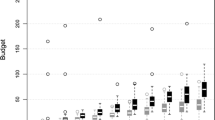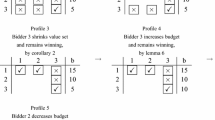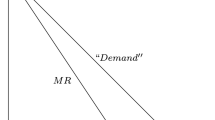Abstract
We consider auction design in a setting with costly preference elicitation. Well designed auctions can help to avoid unnecessary elicitation while determining efficient allocations. Careful design can also lead to more efficient outcomes when elicitation is too costly to permit perfect allocative efficiency. An incremental revelation principle is developed and used to motivate the role of proxied and indirect auction designs. Proxy agents, situated between bidders and an auction, can be used to maintain partial information about bidder preferences, to compute equilibrium bidding strategies based on the available information, and to elicit additional preference information as required. We derive information-theoretic elicitation policies for proxy agents under a simple model of costly elicitation across different auction designs. An experimental analysis demonstrates that indirect mechanisms, such as ascending-price auctions, can achieve better allocative efficiency with less preference elicitation than sealed-bid (direct) auctions because they promote better decisions about preference elicitation.
Similar content being viewed by others
References
A. Archer and E. Tardos, Truthful mechanisms for one-parameter agents, in: Proc. 42nd IEEE Symp. on Foundations of Computer Science (2001).
A. Blum, J. Jackson, T. Sandholm and M. Zinkevich, Preference elicitation and query learning, Journal of Machine Learning Research 5 (2004) 649–667.
L. Blumrosen and N. Nisan, Auctions with severely bounded communication, in: Proc. 43rd Annual Symposium on Foundations of Computer Science (2002).
L. Blumrosen, N. Nisan and I. Segal, Multi-player and multi-round auctions with severely bounded communication, in: Proc. 11th Annual European Symposium on Algorithms (2003).
E. Cantillon and M. Pesendorfer, Auctioning bus routes: The London experience, in: Combinatorial Auctions, eds. P. Cramton, Y. Shoham and R. Steinberg (MIT Press, 2006) Chapter 22.
C. Caplice and Y. Sheffi, Combinatorial auctions for truckload transportation, in: Combinatorial Auctions, eds. P. Cramton, Y. Shoham and R. Steinberg (MIT Press, 2006) Chapter 21.
O. Compte and P. Jehiel, On the virtues of the ascending price auction: New insights in the private value setting, Technical report, CERAS and UCL (2000).
O. Compte and P. Jehiel, Auctions and information acquisition: Sealed-bid or dynamic formats?, Technical report, CERAS and UCL (2002).
W. Conen and T. Sandholm, Preference elicitation in combinatorial auctions, in: Proc. 3rd ACM Conf. on Electronic Commerce (EC-01) (2001) pp. 256–259.
V. Conitzer and T. Sandholm, Computational criticisms of the revelation principle, in: Proc. AAMAS Workshop on Agent Mediated Electronic Commerce (AMEC V), Melbourne, Australia (2003).
S. de Vries, J. Schummer and R. V. Vohra, On ascending Vickrey auctions for heterogeneous objects, Technical report MEDS, Kellogg School, Northwestern University (2004).
C. Ehrman and M. Peters, Sequential selling mechanisms, Economic Theory 4 (1994) 237–253.
K. Fong, Multi-stage information acquisition in auction design, Master’s thesis, Harvard University (2003).
A. Gibbard, Manipulation of voting schemes: A general result, Econometrica 41 (1973) 587–602.
J. Green and J.-J. Laffont, Characterization of satisfactory mechanisms for the revelation of preferences for public goods, Econometrica 45 (1977) 427–438.
A. Greenwald and J.O. Kephart, Shopbots and pricebots, in: Proc. 16th International Joint Conference on Artificial Intelligence (IJCAI-99) (1999) pp. 506–511.
R. Holzman, N. Kfir-Dahav, D. Monderer and M. Tennenholtz, Bundling equilibrium in combinatorial auctions, Games and Economic Behavior 47(1) (2004) 104–123.
B. Hudson and T. Sandholm, Effectiveness of query types and policies for preference elicitation in combinatorial auctions, in: Proc. 3rd Int. Joint. Conf. on Autonomous Agents and Multi Agent Systems (2004) pp. 386–393.
M.O. Jackson, Mechanism theory, in: The Encyclopedia of Life Support Systems (EOLSS Publishers, 2000).
C.D. Kolstad and R.M. Guzman, Information and the divergence between willingness-to-accept and willingness-to-pay, J. Env. Econ. Manag. 38(1) (1999) 66–80.
S.M. Lahaie and D.C. Parkes, Applying learning algorithms to preference elicitation, in: Proc. ACM Conf. on Electronic Commerce (2004) pp. 180–188.
K. Larson and T. Sandholm, Bargaining with limited computation: Deliberation equilibrium, Artificial Intelligence 132(2) (2001) 183–217.
K. Larson and T. Sandholm, Experiments on deliberation equilibria in auctions, in: Proc. 3rd Int. Joint. Conf. on Autonomous Agents and Multi Agent Systems (2004) pp. 394–401.
K. Larson and T.W. Sandholm, Costly valuation computation in auctions, in: Proc. Theoretical Aspects of Rationality and Knowledge VII (2001) pp. 169–182.
J.O. Ledyard, The design of coordination mechanisms and organizational computing, Journal of Organizational Computing 1 (1993) 121–134.
T.K. Lee, Competition and information acquisition in first price auctions, Economic Letters 19 (1985) 129–132.
D. Lehmann, R. Muller and T. Sandholm, The winner determination problem, in: Combinatorial Auctions, eds. P. Cramton, Y. Shoham and R. Steinberg (MIT Press, 2004) Chapter 12.
D. Lehmann, L.I. O’Callaghan and Y. Shoham, Truth revelation in approximately efficient combinatorial auctions, Journal of the ACM 49(5) (2002) 577–602.
D. Levin and J.L. Smith, Equilibrium in auctions with entry, American Economic Review 64 (1994) 585–599.
A. Mas-Colell, M.D. Whinston and J.R. Green, Microeconomic Theory (Oxford University Press, Oxford, 1995).
R.P. McAfee and J. McMillan, Analyzing the airwaves auction, J. Econ. Perspect. 10 (1996) 159–175.
P. Milgrom and R. Weber, A theory of auctions and competitive bidding, Econometrica 50 (1982) 1089–1122.
D. Mishra and D. Parkes, Ascending price Vickrey auctions for general valuations, Technical report, Harvard University (2005).
N. Nisan, Bidding languages for combinatorial auctions, in: Combinatorial Auctions, eds. P. Cramton, Y. Shoham and R. Steinberg (MIT Press, 2006) Chapter 9.
N. Nisan and I. Segal, The communication requirements of efficient allocations and supporting prices, Journal of Economic Theory (2005) to appear.
D.C. Parkes, Iterative combinatorial auctions: Achieving economic and computational efficiency, Ph.D. thesis, Department of Computer and Information Science, University of Pennsylvania (2001).
D.C. Parkes, Price-based information certificates for minimal-revelation combinatorial auctions, in: Agent Mediated Electronic Commerce IV: Designing Mechanisms and Systems, Lecture Notes in Artificial Intelligence, Vol. 2531 (2002) pp. 103–122.
D.C. Parkes and J. Kalagnanam, Models for iterative multiattribute procurement auctions, Management Science 51(3), Special Issue on Electronic Markets (2005) 435–451.
D.C. Parkes and L.H. Ungar, Iterative combinatorial auctions: Theory and practice, in: Proc. 17th National Conference on Artificial Intelligence (AAAI-00) (2000) pp. 74–81.
D.C. Parkes and L.H. Ungar, Preventing strategic manipulation in iterative auctions: Proxy agents and price-adjustment, in: Proc. 17th National Conference on Artificial Intelligence (AAAI-00) (2000) pp. 82–89.
D.M. Reeves and M.P. Wellman, Computing equilibrium strategies in infinite games of incomplete information, in: Proc. of Game-Theoretic and Decision-Theoretic Workshop at AAMAS’03 (2003).
L. Rezende, Mid-auction information acquisition, Technical report, Department of Economics, Stanford University (2001).
A. Ronen, Mechanism design with incomplete languages, in: Proc. 3rd ACM Conf. on Electronic Commerce (EC’01) (2001).
S. Russell and E. Wefald, Principles of metareasoning, Artificial Intelligence 49 (1991) 361–395.
W.F. Samuelson, Competitive bidding with entry costs, Economic Letters 17 (1985) 53–57.
T.W. Sandholm, An implementation of the Contract Net Protocol based on marginal-cost calculations, in: Proc. 11th National Conference on Artificial Intelligence (AAAI-93) (1993) pp. 256–262.
T.W. Sandholm, Limitations of the Vickrey auction in computational multiagent systems, in: Second International Conference on Multiagent Systems (ICMAS-96) (1996) pp. 299–306.
T.W. Sandholm, Automated negotiation, Communications of the ACM 42(3) (1999) 84–85.
M. Stegeman, Participation costs and efficient auctions, Journal of Economic Theory 71 (1996) 228–259.
A.V. Sunderam and D.C. Parkes, Preference elicitation in proxied multiattribute auctions, in: Fourth ACM Conf. on Electronic Commerce (EC’03) (2003) pp. 214–215.
W. Vickrey, Counterspeculation, auctions, and competitive sealed tenders, Journal of Finance 16 (1961) 8–37.
Author information
Authors and Affiliations
Corresponding author
Additional information
A preliminary version of this paper appeared in the Proc. of the IJCAI’99 Workshop on Agent Mediated Electronic Commerce.
Rights and permissions
About this article
Cite this article
Parkes, D.C. Auction design with costly preference elicitation. Ann Math Artif Intell 44, 269–302 (2005). https://doi.org/10.1007/s10472-005-4692-y
Issue Date:
DOI: https://doi.org/10.1007/s10472-005-4692-y




